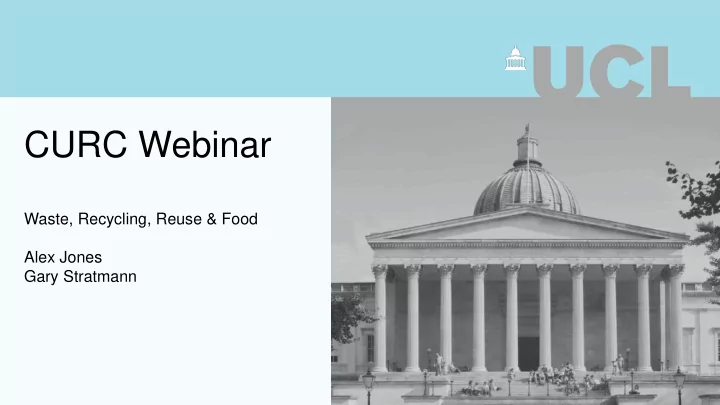

CURC Webinar Waste, Recycling, Reuse & Food Alex Jones Gary Stratmann
UCL at a glance • Founded in 1826, is one of the oldest universities in England • 40,000+ Students • 13,000+ Staff • Over 100 departments, institutes and research centres • Jeremy Bentham’s skeleton is on display on the campus • The first entirely secular university in England • Front Quad was used as a model for ancient Rome in blockbuster ‘Gladiator’.
Recycling & Waste • All waste is managed through contracts with our service provides. • All non hazardous waste is managed via the soft services contract. • The three primary waste streams are: - Dry Mixed Recycling, - General Waste - Food Waste • Recyclate goes to a materials recovery facility for separation and onward recycling. General waste is burned with energy recovery and food waste goes for anaerobic digestion to produce biogas and compost.
Recycling & Waste • With additional collections in specific areas for: - Glass - Coffee grounds - Disposable cups - Confidential waste.
Current Success in Numbers • Across the university we currently have recycling rate of around 65%. • Our ambition is to achieve 85% - More to do! • We send zero waste to landfill. • We have a long term strategy for diverting waste out of hazardous waste streams across the academic estate.
Warp It: How it works • Warp-it was developed as a system for redistributing re- usable material within an organisation to reduce waste and promote re-use. • We use Warp- it primarily as a ‘peer to peer’ system where individual members list times and they can be claimed by other members. Within the University we assist in collecting and delivering items via our portering team. • We have also partnered with other organisations to create a wider audience.
Warp-It: Usage 2017-18 Warpit : • Reused 3065 items • Saved 131538kg CO2, • 156 trees planted or • 47 cars off the road, • Saving UCL £145,061 (£4,000 more than year before) • Over 500k in savings to date!
Warp-It: Comms
Other Re-use Options • In addition to Warp-it, within Estates we work with the Project Team to encourage re-use/ re- configuration of items, particularly furniture rather than buying in new. • We also work with external organisations to pass on re-usable items to charity organisations rather than disposing of them as waste
Bin System • As far as possible bins use uniform signage and waste separations across the university. • The three primary waste streams were agreed in consultation with our contractors to improve the quality of recyclate and minimise contamination while keeping the system as simple as possible. • Signage was developed in discussion across the Estates Team, consolation with students and staff and working with the UCL Department of Behaviour Change. The designs were based on those use for the 2012 Olympic Park, with a view to making them as language agnostic as possible. • The bin signage is backed up with information on the UCL website and communications via the sustainability team.
Bin System
Food Waste • Bulk food waste is collected by a specialist sub-contractor and is used to produce biogas and compost. • Separate collection bins are provided in areas that generate sufficient food waste to make collection economical and are filled by the cleaning/catering teams. • In order opt maintain uniformity of bin deployment, if insufficient food waste is generated in an area to allow separate food waste collections, bins are still provided but the waste goes in with the general waste at point of collection. • Going forward we are exploring options for consolidating food waste collections and doing some on site treatment.
Food Waste
Wrap up: • Want to increase our recycling rate, and uniform signage is key to this. • Furniture are core items for reusing within UCL • Warpit provides UCL a P2P platform primarily • Plenty of opportunities to explore alternative reuse methods/innovation.
Thank you alexander.jones@ucl.ac.uk g.stratmann@ucl.ac.uk
Recommend
More recommend